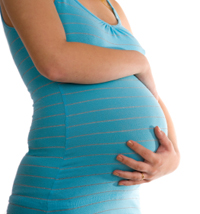 After the trauma of a miscarriage many women take a break to recover before they begin to try again for a baby.
After the trauma of a miscarriage many women take a break to recover before they begin to try again for a baby.
But they may in fact be increasing their risk of having another pregnancy with complications, research has found. Women who conceive within six months of a miscarriage have the best chance of a healthy pregnancy with the lowest likelihood of another miscarriage, according to the British study. The team from Aberdeen University analysed data for almost 31,000 women who had suffered a miscarriage and fallen pregnant again.
Those who conceived within six months after a miscarriage were 44 per cent less likely to have a second one than those who had an interval of six to 12 months before falling pregnant again.
They were also 52 per cent less likely to have an ectopic pregnancy - where the foetus lodges in a fallopian tube and has to be removed - or a termination.
The study found women who conceived within six months were 10 per cent less likely to need a Caesarean or to have a premature baby, and 16 per cent less likely to have a low birthweight baby.
Women with an interval of more than two years were around twice as likely to have an ectopic second pregnancy or a termination. The study, published online in the British Medical Journal, concludes: 'Women who conceive within six months of an initial miscarriage have the best reproductive outcomes and lowest complication rates in a subsequent pregnancy.'
One in five pregnancies ends in miscarriage - around a quarter of a million in the UK each year - mostly before 12 weeks.
Women aged 40 have a 30 per cent chance of miscarriage, which rises to 50 per cent in those aged 45 or more, according to the study.
The researchers said WHO guidance may not be appropriate to Western countries, where many women delay childrearing until after 35 and women should not be discouraged from trying again.
Short intervals also seemed to increase a woman's chance of conceiving again. Of the women in the study, 41 per cent conceived within six months of a first miscarriage, 25 per cent after six to 12 months and 10 per cent after 12 to 18 months.
The authors said it was unclear why fertility declined with a longer interval. Other researchers have suggested a pregnancy may enhance the functional-capacity of the reproductive system, while women who have recently been pregnant may be leading a healthier lifestyle.
Ruth Bender Atik, director of the Miscarriage Association, said: 'It's a really interesting study. 'I think it's going to be reassuring for women, many of whom want to try again soon after a miscarriage but are worried about doing so.' However, doctors stressed that psychological distress was also an important factor when advising a woman to delay trying again for a baby after a miscarriage.
Mervi Jokinen, of the Royal College of Midwives, said: 'Miscarriage can have an emotional, as well as a physical impact on a woman.
The decision for a woman to plan for a subsequent pregnancy is one that we would encourage her to discuss with her midwife and doctor.'
Article: www.dailymail.co.uk 6th August 2010